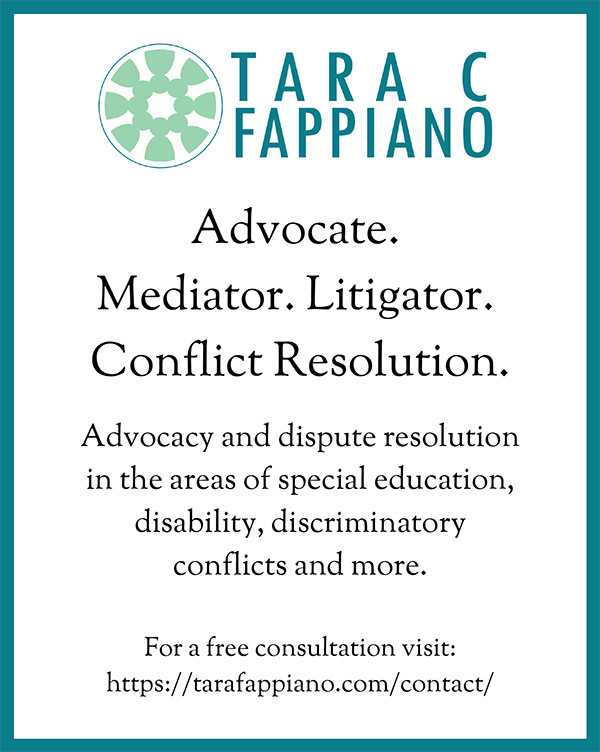This fall, I dropped my oldest child off for his junior year of college. For our family, this is always a time of excitement, but also one of trepidation. The transition from high school to higher education, from childhood to adulthood, is full of new and evolving challenges. Those challenges are different for students with special needs. Proactive planning, collaboration, and communication, especially between parent and student, are the keys to a successful college journey.

Transition Planning
First, college may or may not be in your student’s future. Proper transition planning should begin early in high school, if not sooner. Work with your school district to understand the end goal for your student, with their input. Is a college experience realistic? Is it realistic after four years, or might your student benefit from an extra year of high school, a vocational experience, or skill building? What does your district or community offer that may be appropriate? Does your student intend to go into the workforce, or do they need to explore other supportive services after graduation? These are all issues that can and should be discussed during your student’s high school annual review meetings. Setting these goals earlier, even before high school, allows for practical planning over time to put all appropriate supports in place.
While every situation is different, all students should request a final evaluation as they enter junior or senior year to assist with some of these decisions. If the student does intend to go to college, that evaluation will be current and may be used to assist in securing reasonable accommodations. As such, the evaluation should include information to assist with the spectrum of potential requests and needs that may not exist in the school setting.
Choosing a College
The process of choosing a college is daunting for all families. For students with special needs, there are even more factors to consider. Will your student board at school or need to commute? Will they live at school? What do the residential facilities look like? Can your student live independently with their peers? What is the overall size of the school, class size, and student to professor ratio? What supports are available for all students (tutoring services, writing centers, mental health services, counseling, and medical services)? What additional supportive programs are available to students with special needs, and at what cost?
The above questions may all be answered relatively easily. But there are other less tangential aspects of college life, particularly for a student with special needs, which may impact a student’s success. One important consideration is how easy it is to get answers to your questions. Maybe more specifically, the responsiveness of the disability support office and other faculty will be very telling. If it is difficult to get information when applying, it will continue to be difficult as a student. If the school is not supportive of a student with different needs, there are plenty of schools that will be. The overall culture of an institution is best vetted by speaking with students and other parents, not necessarily admission representatives. This is a big decision, and an expensive one, so the choice should feel right from the beginning.
Getting Ready to Go
When your child turns 18, in the eyes of the law and therefore colleges, they are an adult. It is often difficult for parents to view their children this way, so abruptly. As a parent, you are probably accustomed to communicating with your student’s teachers, schools, counselors, and other support personnel regularly. In college, that will no longer be the case. In addition, your student is going to feel a new sense of independence that comes from being a college student. They may be more resistant to your help – or help from anyone. They may not take advantage of available resources, or not know how to do so. They may feel they do not need the same level of support that they had before. In college, there is little structure, a lot of free time, and it is easy for a few bad choices or missteps to affect an entire semester.
As a family, you can prepare for these challenges. First, talk to your student about your expectations, and the expectations of the college. Also speak to them about their expectations. Agree as a family on the expected level of communication, and your access as a parent to your student’s information, such as grades and schedules. There are various legal documents that may give a parent access to financial information, medical information, and academic information that the institution otherwise cannot share. However, do not expect that a professor will ever communicate with a parent about your student’s daily assignments, work product, or interactions with your student. Some support personnel may be willing to have some collaborative conversations to support the student; but their preference will always be to work with the student directly to foster independence and self-determination.
Second, prepare your student for the challenge ahead, and put support systems in place to help. For example, if your student has executive functioning challenges, there is a wealth of technological resources that can help with reminders, organizing assignments, and being in class on time. Consider structuring the unstructured time by doing such things as blocking out time for meals, doing work, studying, and exercise.
If your student gets off track, they should know how to get immediate assistance and from where. Speaking from experience, it is very difficult for parents to be that voice. You are now far away. If the only interactions you have with your student are to discuss the “to do” list, or to problem solve, it can have a negative impact on your relationship with your student. Support services on campus, or even outside resources like coaches, can make all the difference.
Finally, your student should apply for accommodations if they need them to succeed. Professors need not modify the curriculum, but a student with a disability has a right to reasonable accommodations that allow them to access that curriculum and the educational facilities. Generally, applications must be made through the disability support services office each semester. But every college has its own rules and processes that may apply, so it is important to familiarize yourself with the process.
It is then the student’s responsibility to ask for those accommodations. They must be their own advocate, providing copies of the letters to their professors each semester. Unlike high school, the student may affirmatively ask for an accommodation. In the public school setting, services were legally mandated once included in an Individualized Education Program or otherwise. In college, accommodations are more like a safety net – once obtained, they are there if the student asks for them. To encourage self-advocacy, talk to your student about how they feel about the need to take the accommodations, and encourage them to use them if it will help them be more successful.
Some common accommodations include separate testing locations, extended time, and technological supports. Residential accommodations may also be available. Students who take on internships, externships, or attend programs off campus, often hosted by third parties, must separately seek accommodations for those environments. Similarly, outside testing agencies have their own separate applications for a student to secure accommodations.
With preparation and planning, communication and collaboration, love and support, college life can be a wonderful, exciting, and successful experience for your student.
Tara C. Fappiano is a Special Education and Disability Advocate who regularly works with families to prepare their students for success in college and beyond. She also acts as an advocate for her clients when challenges arise in post-secondary educational settings. She may be reached at tcf@tarafappiano.com, and you can learn more about her practice at www.tarafappiano.com.






